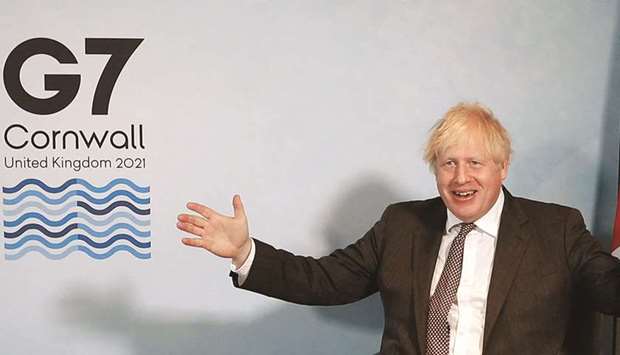British Prime Minister Boris Johnson gave yesterday his strongest hint yet that a plan to lift all coronavirus (Covid-19) restrictions would be delayed, due to concern over the spread of a new variant.
The Delta variant, which first emerged in India, has caused a surge in Covid-19 cases in Britain, throwing into doubt government plans to ease curbs from June 21.
Speaking on the sidelines of the G7 leaders’ summit in Cornwall in southwest England, Johnson said that the spread was a matter of “serious, serious concern”.
The government had hoped that the success of one of the world’s fastest rollouts of the vaccines would end the limits on indoor gatherings and the requirement of nightspots and restaurants to provide only table service.
However, the rapid spread of the Delta Covid-19 variant has thrown those plans into jeopardy, meaning the government will delay the lifting of the restrictions by a month, the Daily Telegraph reported.
A four-week delay would push back the easing of restrictions to July 19.
“It’s clear that the Indian variant is more transmissible, and it’s also true that the cases are going up, and that the levels of hospitalisation are going up,” Johnson told Sky News. “Now, we don’t know exactly to what extent that is going to feed through into extra mortality, but clearly it’s a matter of serious, serious concern.”
Asked if he was less optimistic than he was at the end of May that restrictions could be eased as planned, a downbeat Johnson responded: “Yes, that’s certainly fair.”
He added that while some data was “still open to question”, a formal announcement would come tomorrow.
On Friday, the government said the Delta variant was 60% more transmissible in households than the variant that forced the country into its last complete lockdown in January.
The research from Public Health England also showed there had been 42,323 identified cases of the Delta variant in the UK, according to data – up from 29,892 on June 2.
The Alpha variant, first identified in Kent, southeast England, drove a huge surge of Covid-19 cases in January, and hit early in Britain’s mass vaccination campaign.
It caused a wave of Covid-19 cases that stretched the state-run National Health Service (NHS) close to breaking point.
Johnson said the current situation is “dramatically different from what it was in either of the first two waves of the pandemic” because of what he called the “effectiveness of the vaccine rollout”.
Faced with the Delta variant, the UK has stepped up its vaccine programme, and has now administered nearly 71mn jabs, with over 40% of the total population fully vaccinated.
Any delay to Johnson’s unlocking roadmap risks triggering a row with some politicians in his party, who have opposed keeping the restrictions in place.
Karan Bilimoria, president of the Confederation of British Industry, said that companies understood the need to tread cautiously in a health crisis but many firms in sectors such as hospitality were barely breaking even under the current rules.
“If there’s a full delay for two to four weeks, then it’s got to be irreversible: we cannot have stop-start and as long as that is clarified we will have to cope with this delay,” he said.
The government has always said decisions at each stage of unlocking depend on the data.
Yesterday Britain reported 7,738 new Covid-19 19 cases, down slightly from a day earlier, when they were the highest since February.
Any decision Johnson makes only applies to England because the devolved governments in Scotland, Wales and Northern Ireland make most public health decisions in their nations.
Britain’s total Covid-19 death toll is over 127,000, but the number of daily deaths have fallen following a third national lockdown and a rapid vaccine rollout.

Prime Minister Johnson: It’s clear that the Indian (Delta coronavirus) variant is more transmissible, and it’s also true that the cases are going up, and that the levels of hospitalisation are going up.
